Greece Tours
Trek volcanoes, sail around the islands and explore the archaeological ruins in Athens
Popular tours
- Save3%
 View Tour
View TourSail in Greece - Corfu - 8 Days
- Corfu Town to Corfu Town
- Age group: 7 - 99
- Max group size: 25
Was:£668From£647 - Save16%
 View Tour
View TourSailing Greece - Mykonos to Santorini - 8 Days
- Mykonos to Firá
- Age group: 16 - 100
- Max group size: 10
Was:£1,199From£1,009 - Save21%
 View Tour
View TourGreek Island Hopping: Paros, Ios & Santorini Sunsets - 7 Days
- Athens to Firá
- Age group: 18 - 39
- Max group size: 16
Was:£1,149From£910 - Save26%
 View Tour
View TourSail & Hike Greece: Athens to Mykonos - 8 Days
- Lávrio to Mykonos
- Age group: 15 - 99
- Max group size: 11
Was:£1,285From£954 - Save3%
 View Tour
View TourSail in Greece - Rhodes - 8 Days
- Rhodes to Rhodes
- Age group: 1 - 99
- Max group size: 12
Was:£710From£689 - Save3%
 View Tour
View TourSail in Greece - Zante - 8 Days
- Zakynthos to Zakynthos
- Age group: 4 - 90
- Max group size: 25
Was:£668From£647
Greece Tours
Explore the Land of Ancient Legends and Timeless Beauty with Greece Tours and Holidays
Welcome to Greece, a captivating destination that enchants visitors with its rich history, breathtaking landscapes, and vibrant culture. With our Greece tours and holidays, embark on an unforgettable journey to a land that has shaped the course of civilization and continues to mesmerize travelers from around the globe.
Immerse yourself in the wonders of this Mediterranean gem as you discover ancient ruins, sun-kissed beaches, picturesque islands, and delectable cuisine. Greece is a country that seamlessly blends the old and the new, where ancient myths coexist with modern cosmopolitan cities. It's a place that beckons you to explore its treasures and create memories that will last a lifetime.
Step back in time and explore the iconic ancient sites that have become the epitome of Greece's cultural heritage. Delve into the grandeur of Athens, the birthplace of democracy, as you ascend the mighty Acropolis and marvel at the Parthenon, a symbol of classical Greece. Wander through the ruins of Delphi, the ancient sanctuary that was considered the center of the world, and be inspired by the wisdom of the Oracle.
Escape to the idyllic islands that dot the Aegean Sea, each offering a unique charm and allure. Santorini will enchant you with its whitewashed buildings perched on dramatic cliffs, where you can witness awe-inspiring sunsets that paint the sky in a kaleidoscope of colors. Mykonos beckons with its vibrant nightlife, pristine beaches, and charming labyrinthine streets lined with blue-domed churches. And let's not forget Crete, the birthplace of the mighty Minoan civilization, where ancient ruins blend harmoniously with stunning landscapes and welcoming locals.
Indulge your senses in the delicious flavors of Greek cuisine, known for its fresh ingredients, Mediterranean influences, and the famous Mediterranean diet. Savor mouthwatering souvlaki, creamy tzatziki, flaky spanakopita, and succulent grilled seafood. Pair your meals with a glass of ouzo or sip on the renowned local wines that have been produced for centuries.
Beyond the ancient ruins and breathtaking islands, Greece offers a myriad of experiences for every traveler. Hike through the rugged gorges of Samaria or explore the monasteries perched atop towering rock formations in Meteora. Cruise along the azure waters of the Ionian or Aegean Sea, discovering hidden coves and secluded beaches. Engage in water sports, go snorkeling or scuba diving, or simply bask in the Mediterranean sun on golden sandy shores.
Greece is a destination that transcends time, captivating visitors with its unparalleled beauty, ancient heritage, and warm hospitality. Whether you seek historical wonders, natural splendor, or simply an escape to paradise, our Greece tours and holidays offer an authentic and unforgettable experience.
Uncover the secrets of Greece, where history, mythology, and natural beauty intertwine, and create memories that will stay with you forever. Let us guide you on a journey that will ignite your imagination, nourish your soul, and leave you yearning for more. Book your Greece tour or holiday today and embark on an extraordinary adventure that will forever hold a special place in your heart.
When is the best time to visit Greece?
The best time to visit Greece largely depends on your preferences and the activities you plan to engage in. Greece enjoys a Mediterranean climate with hot, dry summers and mild, wet winters. Here's a breakdown of the different seasons and what they offer:Summer (June to August): This is the peak tourist season in Greece when the weather is hot and sunny. The islands and coastal areas are bustling with visitors enjoying the crystal-clear waters and vibrant beach culture. It's an ideal time for swimming, sunbathing, and outdoor activities. However, popular destinations can be crowded, and accommodation prices tend to be higher. If you prefer a lively atmosphere and don't mind the crowds, summer is a great time to visit.
Spring (April to May) and Autumn (September to October): These shoulder seasons are considered the best time to visit Greece for many travelers. The weather is pleasant, with mild temperatures and fewer crowds compared to the peak summer season. It's a fantastic time to explore historical sites, enjoy outdoor activities like hiking or sailing, and experience a more relaxed ambiance. The landscapes are lush and blooming in spring, while autumn offers beautiful colors and a slower pace.
Winter (November to March): Greece experiences its low season during winter, particularly on the islands. The weather is milder compared to other European destinations, but it can be wet and chilly. Winter is a great time to visit if you're interested in exploring cultural sites, museums, and historical cities like Athens. Additionally, it's an opportunity to experience local life without the crowds, and accommodation prices are generally lower.
It's important to note that specific destinations within Greece may have slight variations in climate and tourist activity. For example, the islands tend to have milder winters and longer summer seasons compared to mainland Greece. If you're planning to visit popular tourist destinations like Santorini or Mykonos, expect higher crowds during the summer months.
Ultimately, the best time to visit Greece depends on your preferences and what you want to experience. Consider the weather, activities, and crowds when deciding on the timing of your trip. Regardless of the season, Greece's rich history, stunning landscapes, and warm hospitality will leave you with unforgettable memories.
Will I need a visa to travel to Greece?
The visa requirements for traveling to Greece depend on your nationality and the purpose and duration of your visit. Here is some general information, but it's important to check with the Greek embassy or consulate in your country or consult with a travel agent to confirm the specific visa requirements that apply to you:
Schengen Area: Greece is a member of the Schengen Area, which is a group of European countries that have abolished internal border controls. If you are a citizen of a country that is part of the Schengen Area, you generally do not need a visa to enter Greece for short stays of up to 90 days within a 180-day period. This rule applies to many countries, including the United States, Canada, Australia, and many European nations. However, please note that specific rules and visa-exempt agreements can vary for each country, so it's essential to confirm the requirements based on your nationality.
Non-Schengen Countries: If you are a citizen of a country that is not part of the Schengen Area, you may need to apply for a Schengen visa to enter Greece or any other Schengen country. The Schengen visa allows you to travel within the Schengen Area for up to 90 days within a 180-day period. You should apply for the visa at the Greek embassy or consulate in your country or the embassy/consulate of the Schengen country where you plan to spend the most time during your trip.
Visa Extensions: If you wish to stay in Greece for longer than the allowed 90 days or for a purpose other than tourism, you may need to apply for a different type of visa, such as a work visa, study visa, or residency permit. These visas have specific requirements and application processes, so it's important to consult with the Greek embassy or consulate in your country for detailed information.
It's important to note that visa requirements can change, so it's recommended to check the official websites of the Greek Ministry of Foreign Affairs or contact the nearest Greek embassy or consulate in your country for the most up-to-date information and guidance on visa requirements.
Remember to apply for a visa well in advance of your planned travel dates to allow for processing time. It's always better to be prepared and have the necessary visa documentation to ensure a smooth and hassle-free trip to Greece.
What are the must see destinations in Greece?
Greece is a treasure trove of must-see destinations that showcase its rich history, natural beauty, and captivating culture. Here are some of the top must-see destinations in Greece:
Athens: Start your journey in the capital city of Athens, home to iconic historical sites such as the Acropolis, Parthenon, and the ancient Agora. Explore the vibrant neighborhoods of Plaka and Monastiraki, visit world-class museums like the Acropolis Museum, and soak in the energetic atmosphere of this ancient metropolis.
Santorini: Known for its picturesque white-washed buildings, blue-domed churches, and breathtaking sunsets, Santorini is an enchanting island in the Cyclades. Explore the charming villages of Oia, Fira, and Imerovigli, relax on the unique volcanic beaches, and indulge in the local cuisine and wines.
Mykonos: Famous for its vibrant nightlife, beautiful beaches, and cosmopolitan atmosphere, Mykonos is a popular destination among travelers. Stroll through the charming streets of Mykonos Town, discover the iconic windmills, and enjoy the lively beach clubs and bars.
Crete: The largest Greek island, Crete offers a diverse range of experiences. Explore the ancient ruins of Knossos, hike the stunning Samaria Gorge, and relax on the stunning beaches of Elafonisi and Balos. Sample the delicious Cretan cuisine and immerse yourself in the island's rich history and vibrant local culture.
Delphi: Journey to Delphi, the ancient sanctuary and oracle of Apollo, nestled amidst beautiful mountain scenery. Explore the archaeological site and marvel at the well-preserved ruins, including the Temple of Apollo and the Theater. Delphi is not only historically significant but also offers breathtaking views of the surrounding landscape.
Meteora: Located in central Greece, the monasteries of Meteora are a UNESCO World Heritage site and a truly awe-inspiring destination. Perched atop towering rock formations, these monasteries offer a glimpse into the spiritual and cultural heritage of Greece. Visit the monasteries, hike the trails, and admire the breathtaking views of the dramatic landscape.
Rhodes: Discover the medieval charm of Rhodes, an island in the Dodecanese. Explore the fortified Old Town of Rhodes, a UNESCO World Heritage site, with its ancient walls, cobbled streets, and medieval architecture. Visit the Palace of the Grand Master, stroll along the Mandraki Harbor, and relax on the beautiful beaches.
Olympia: Step back in time to ancient Greece by visiting Olympia, the birthplace of the Olympic Games. Explore the archaeological site, including the Temple of Zeus and the ancient stadium, and visit the fascinating Archaeological Museum.
These are just a few highlights of the many incredible destinations that Greece has to offer. Each region and island has its own unique charm and attractions, so whether you're seeking history, natural beauty, or a relaxed beach getaway, Greece promises an unforgettable journey filled with ancient wonders and breathtaking landscapes.
What is the local currency in Greece, and can I use credit cards?
The local currency in Greece is the Euro (€). It is widely accepted throughout the country, and you can easily exchange your currency to Euros at banks, exchange offices, or ATMs.
Credit cards are widely accepted in Greece, especially in tourist areas, hotels, restaurants, and larger shops. Visa and Mastercard are the most commonly accepted cards, followed by American Express. However, it's a good idea to carry some cash, especially for smaller establishments, local markets, and places that might not accept cards.
ATMs are widely available in Greece, and you can use your debit or credit card to withdraw cash in Euros. Keep in mind that some ATMs may charge a small fee for international transactions, so it's a good idea to check with your bank before your trip.
When using credit cards or ATMs, it's important to notify your bank or credit card provider of your travel plans to Greece. This helps prevent any potential issues with card usage or withdrawals being blocked due to suspected fraud. Additionally, it's advisable to have a backup card or alternative payment method, such as a small amount of cash, in case of any unforeseen circumstances.
Overall, Greece is a relatively card-friendly destination, but it's always a good idea to have some cash on hand, especially when visiting more remote areas or smaller establishments.
Is Greece a good family holiday destination?
Yes, Greece is a fantastic destination for a family holiday. With its rich history, stunning landscapes, and welcoming culture, Greece offers a wide range of experiences and attractions that cater to all age groups. Here are some reasons why Greece is a great family holiday destination:
Family-friendly beaches: Greece is known for its beautiful beaches with crystal-clear waters, making it an ideal destination for families. Many beaches offer shallow waters, which are safe and suitable for young children. Some popular family-friendly beach destinations include Crete, Rhodes, Corfu, and Halkidiki.
Mythology and history: Greece is the birthplace of ancient civilizations and myths, providing a unique educational experience for children. Explore ancient sites like the Acropolis in Athens, the Palace of Knossos in Crete, or the ruins of Olympia, where the ancient Olympic Games were held. Kids can learn about history while having fun exploring these fascinating sites.
Outdoor activities: Greece's diverse landscapes offer various outdoor activities for families to enjoy. From hiking and cycling to water sports and boat trips, there are plenty of opportunities to explore the natural beauty of Greece. National parks such as Mount Olympus and the Vikos Gorge provide excellent hiking trails suitable for families.
Family-friendly resorts and accommodations: Greece offers a wide range of family-friendly resorts and accommodations, including hotels, villas, and apartment rentals. Many of these establishments provide amenities and facilities specifically designed for families, such as swimming pools, children's clubs, playgrounds, and entertainment programs.
Delicious and healthy cuisine: Greek cuisine is renowned for its fresh and healthy ingredients, making it a great option for families. From traditional dishes like souvlaki, moussaka, and Greek salads to fresh seafood and local specialties, there are plenty of delicious and nutritious options to satisfy even the pickiest eaters.
Warm hospitality: Greeks are known for their warm hospitality and love for children. Families can expect a welcoming and friendly atmosphere throughout their stay, with locals going out of their way to make children feel comfortable and entertained.
Safety: Greece is generally considered a safe destination for travelers, including families. The locals prioritize family values and safety, making it an ideal place for a worry-free family vacation.
With its combination of history, natural beauty, and family-friendly amenities, Greece offers a well-rounded and enjoyable experience for families of all sizes. Whether you're exploring ancient ruins, building sandcastles on the beach, or indulging in delicious food, Greece has something to offer for every member of the family.
Is Greece a good destination for solo travellers?
Yes, Greece is a fantastic destination for solo travelers. Whether you're seeking adventure, relaxation, or cultural exploration, Greece offers a wide range of experiences that cater to solo travelers. Here are some reasons why Greece is a great destination for those traveling alone:
Warm hospitality: Greeks are known for their warm and friendly hospitality. Solo travelers can expect a welcoming atmosphere and encounters with locals who are often willing to offer assistance and engage in conversations. You'll likely find it easy to connect with the locals and fellow travelers, making your solo trip more enjoyable.
Safety: Greece is generally considered a safe country for travelers, including solo travelers. The crime rates are relatively low, and the locals prioritize the safety and well-being of visitors. Of course, it's always important to take common-sense precautions, such as being aware of your surroundings and taking care of your belongings.
Cultural exploration: Greece is rich in history, art, and culture, offering plenty of opportunities for solo travelers to immerse themselves in the country's heritage. Explore ancient ruins, visit world-class museums, and attend cultural events to delve into Greece's fascinating past and present.
Island hopping: Greece is renowned for its stunning islands, and solo travelers have the freedom to hop from one island to another, discovering unique landscapes and vibrant island life. Whether you choose the popular islands like Santorini and Mykonos or opt for off-the-beaten-path destinations, each island has its own charm and attractions to explore.
Outdoor adventures: Greece's diverse landscapes provide numerous opportunities for outdoor activities, such as hiking, sailing, and water sports. Solo travelers can enjoy exploring hiking trails, taking boat trips to secluded beaches, or participating in organized adventure tours.
Culinary delights: Greek cuisine is a treat for solo travelers. Indulge in delicious Greek dishes, savor fresh seafood, and sample local specialties. Greek tavernas and cafes provide a social setting where you can enjoy a meal and engage in conversations with locals and fellow travelers.
Solo-friendly accommodations: Greece offers a variety of accommodations suitable for solo travelers, including hostels, guesthouses, and budget hotels. These establishments often provide common areas where you can meet other travelers and socialize if desired.
Whether you prefer to enjoy your own company or meet fellow travelers along the way, Greece offers a blend of cultural exploration, outdoor adventures, and warm hospitality that makes it a fantastic destination for solo travelers. Embrace the freedom and flexibility of traveling alone and create unforgettable memories in this captivating country.
Is Greece a safe destination?
Greece is generally considered a safe destination for travelers. The country has a relatively low crime rate, and violent crime is rare. However, like any travel destination, it's important to take certain precautions to ensure a safe and enjoyable trip. Here are some tips for staying safe in Greece:
Be vigilant in crowded areas: As with any popular tourist destination, it's important to be cautious in crowded areas, such as popular attractions, markets, or public transportation. Keep an eye on your belongings and be mindful of pickpockets. Avoid displaying valuable items openly and consider using a money belt or a secure bag to keep your belongings safe.
Take care of your personal belongings: Keep your passport, money, and other important documents secure at all times. Use hotel safes or secure lockers to store your valuables when not in use. It's also advisable to make digital copies of your important documents and store them in a secure cloud-based service or email them to yourself.
Use reliable transportation: When using taxis or other forms of transportation, make sure to use official and licensed services. Be cautious of unmarked taxis and always ask for the fare estimate before starting your journey. If possible, arrange transportation in advance through reputable companies or use ride-hailing apps.
Follow local laws and customs: Familiarize yourself with local laws and customs and ensure that you respect them during your stay. Be mindful of cultural sensitivities and dress modestly when visiting religious sites. It's also important to adhere to local regulations, such as smoking restrictions or rules regarding the use of drones.
Stay informed about current events: Before and during your trip, it's a good idea to stay informed about any local events or situations that may affect your safety. Monitor travel advisories issued by your home country's government and keep updated on any relevant news or developments in Greece.
Take precautions when swimming: Greece is known for its beautiful beaches, but it's important to be cautious when swimming. Pay attention to local beach regulations, swim in designated areas with lifeguards present, and be mindful of currents and weather conditions.
Trust your instincts: Finally, trust your instincts and use common sense. If a situation feels unsafe or uncomfortable, remove yourself from it. If you need assistance or have concerns, seek help from authorities or your hotel staff.
By following these general safety tips and using your common sense, you can enjoy a safe and memorable trip to Greece. Remember that it's always a good idea to stay informed, be aware of your surroundings, and take precautions to ensure a pleasant and worry-free experience.
Will I require any vaccinations to travel to Greece?
As of my knowledge cutoff in September 2021, there are no specific vaccinations required for travelers visiting Greece. However, it is always advisable to consult with a healthcare professional or travel medicine specialist before your trip to Greece to discuss any recommended vaccinations or health precautions based on your individual health status, medical history, and travel plans.
Routine vaccinations, such as measles-mumps-rubella (MMR), diphtheria-tetanus-pertussis, varicella (chickenpox), and seasonal influenza, should be up to date for all travelers. Additionally, Hepatitis A and B vaccines are recommended for most travelers, as these diseases can be transmitted through contaminated food, water, or close contact with infected individuals.
It is also a good idea to ensure that you are up to date on routine vaccines, such as measles, mumps, rubella, and tetanus-diphtheria-pertussis, regardless of travel destinations. Other vaccines that may be recommended depending on the duration of your stay, activities planned, and specific health conditions include Hepatitis B, Rabies, and Tick-borne Encephalitis.
Remember to schedule your vaccination appointments well in advance of your trip to allow sufficient time for the vaccines to take effect.
Please note that vaccination recommendations and requirements can change over time, so it's essential to consult with a healthcare professional or visit a specialized travel health clinic to get the most up-to-date information and personalized advice for your specific travel plans. They will have access to the latest recommendations from health authorities and can provide guidance based on your individual needs.
How does the rooming work on tours?
Small group tours in Greece typically involve a set itinerary where you travel with a group of fellow travellers and a tour leader/guide. Accommodation arrangements vary depending on the specific tour you choose. Here are some common aspects of rooming arrangements on small group tours:
Shared Rooms: In order to promote camaraderie and facilitate interaction among group members, most tours arrange shared accommodation. This means you will be paired with another member of the same gender from the group to share a room. Roommates may sometimes change periodically throughout the tour.
Single Supplement: If you prefer to have your own room and privacy, you may have the option to pay a single supplement fee. This additional fee allows you to have your own room for the duration of the tour. However, please note that single supplements can vary in cost and availability.
Roommate Matching: Tour operators usually offer roommate matching services, where they try to pair you with a suitable roommate based on your preferences, such as age range. This can help ensure compatibility and a more enjoyable experience for all participants.
Rooming Preferences: When booking your small group tour, it's important to communicate your rooming preferences to the tour operator. If you have specific requirements or preferences, such as sharing with a friend or a specific roommate request, it's advisable to inform the tour operator during the booking process.
It's important to carefully read the tour details and inclusions provided by the tour operator to understand their specific rooming policies. If having your own room is a priority, make sure to inquire about the availability of single supplements and any associated costs before booking your tour.
Keep in mind that while sharing a room with a fellow traveller can be a great way to meet new people and build connections, having your own room provides more privacy and flexibility. Consider your preferences and the dynamics of the tour when deciding whether to opt for a shared room or pay for a single supplement.
Remember to communicate your needs and preferences clearly with the tour operator during the booking process to ensure a comfortable and enjoyable accommodation experience on your small group tour in Greece.
What is the food like in Greece?
Greek cuisine is renowned for its delicious flavors, fresh ingredients, and Mediterranean influences. It offers a diverse range of dishes that reflect the country's rich culinary history and regional variations. Here are some highlights of Greek food:
Fresh Mediterranean ingredients: Greek cuisine emphasizes the use of fresh, seasonal ingredients. You'll find an abundance of flavorful vegetables, herbs, fruits, olive oil, and seafood in traditional Greek dishes.
Meze and appetizers: Greek meals often start with a variety of meze, which are small dishes similar to Spanish tapas. Popular meze include tzatziki (yogurt and cucumber dip), dolmades (stuffed grape leaves), fava (split pea puree), and spanakopita (spinach and feta pastry).
Salads and dips: Greek salads are simple yet delicious, typically made with ripe tomatoes, cucumbers, onions, olives, and feta cheese, dressed with olive oil and lemon juice. Taramasalata (fish roe dip), melitzanosalata (eggplant dip), and hummus are also common dips enjoyed with pita bread.
Grilled meats and seafood: Souvlaki and gyros are popular street foods in Greece. Souvlaki consists of skewered and grilled meat (commonly pork or chicken) served with pita bread, tzatziki, and garnishes. Gyros are similar but usually cooked on a vertical rotisserie. Seafood lovers can enjoy fresh fish, calamari, octopus, and prawns prepared simply and grilled to perfection.
Moussaka and pastitsio: These hearty baked dishes are considered Greek comfort food. Moussaka features layers of eggplant, minced meat (usually lamb or beef), and béchamel sauce. Pastitsio is a pasta dish with layers of ground meat, macaroni, and béchamel sauce, baked until golden.
Greek desserts: End your meal with sweet treats like baklava (filo pastry with nuts and honey syrup), loukoumades (fried dough balls drizzled with honey and cinnamon), and galaktoboureko (semolina custard wrapped in filo pastry).
Local wines and spirits: Greece has a long history of winemaking, and you can savor a variety of Greek wines, including whites like Assyrtiko and reds like Xinomavro. Ouzo, a traditional Greek anise-flavored spirit, is popular for aperitifs.
Remember that Greek cuisine varies by region, with each island and mainland area having its own specialties. Exploring local tavernas and restaurants is a delightful way to experience the diverse flavors of Greece.
Can I drink the tap water in Greece?
In Greece, tap water is generally considered safe to drink. The water supply infrastructure in major cities and tourist destinations is well-maintained, and the water undergoes treatment to ensure its quality. The tap water in Greece is subject to strict regulations and is regularly tested for safety.
However, some travelers, especially those with sensitive stomachs or those who are not accustomed to the local water, may prefer to drink bottled water. Bottled water is readily available in supermarkets, convenience stores, and restaurants throughout Greece.
If you are unsure about the water quality or prefer to err on the side of caution, it is advisable to stick to bottled water for drinking and brushing your teeth. Also, consider using bottled water when consuming ice cubes or preparing beverages.
As with any destination, it is recommended to consult with locals or your accommodation staff if you have specific concerns about the tap water in a particular area of Greece. They will be able to provide you with the most up-to-date information and advice based on the local conditions.
Are there any cultural norms in Greece I should follow?
Yes, when visiting Greece, it is helpful to be aware of and respect certain cultural norms and customs. Here are some cultural norms in Greece:
Greetings: Greeks are generally warm and friendly. It is customary to greet others with a handshake, accompanied by direct eye contact and a smile. In more informal settings, close friends and family may greet each other with kisses on the cheek.
Polite expressions: Greeks appreciate polite expressions such as "please" (parakalo) and "thank you" (efharisto). Using these phrases when interacting with locals, whether in shops, restaurants, or other settings, is considered polite and respectful.
Dress modestly: When visiting religious sites such as churches and monasteries, it is important to dress modestly. Both men and women should cover their shoulders and avoid wearing shorts or revealing clothing. It is recommended to carry a shawl or scarf to cover up if needed.
Punctuality: Greeks tend to have a more relaxed approach to time, so being fashionably late (up to 15 minutes) is somewhat acceptable. However, it is still important to be punctual for formal meetings or appointments.
Table manners: When dining with Greeks, it is customary to wait until the host invites you to start eating. It is polite to finish everything on your plate as it indicates that you enjoyed the meal. Also, keep in mind that Greeks often enjoy long and leisurely meals, so don't rush the dining experience.
Respect religious customs: Greece has a rich religious history, and many Greeks are Orthodox Christians. When entering a church, it is important to dress modestly, speak quietly, and avoid taking photographs unless permitted. Be respectful during religious ceremonies or when lighting a candle.
Public displays of affection: Greeks are generally comfortable with public displays of affection among couples, but it is advisable to exercise discretion and avoid excessive displays in more conservative areas or religious sites.
Tipping: Tipping is customary in Greece. In restaurants, it is common to leave a tip of around 10% of the bill. In cafes and bars, rounding up the bill or leaving some loose change is appreciated. Tipping hotel staff, taxi drivers, and tour guides is also customary.
By being respectful of Greek culture and customs, you can enhance your experience and interactions with locals during your visit to Greece. Remember that Greeks are generally welcoming and appreciate visitors who show an interest in their traditions and way of life.
What should I pack for a trip to Greece?
When packing for a trip to Greece, it's important to consider the season and the activities you plan to engage in. Here are some essentials to pack for your trip:
Lightweight and breathable clothing: Greece has a Mediterranean climate, so pack lightweight and breathable clothing like shorts, t-shirts, sundresses, and skirts. Don't forget to pack a light jacket or sweater for cooler evenings, especially if you're visiting during spring or autumn.
Swimwear: Greece is famous for its beautiful beaches and crystal-clear waters, so pack your favorite swimwear. Whether you prefer a swimsuit or swim trunks, having them on hand will allow you to enjoy the stunning coastline.
Comfortable shoes: Greece offers a mix of historical sites, cobblestone streets, and beautiful landscapes. Make sure to pack comfortable walking shoes or sandals for exploring archaeological sites, strolling through cities, or hiking in nature.
Sun protection: Greece experiences plenty of sunshine, so pack essentials like sunscreen, a wide-brimmed hat, and sunglasses to protect yourself from harmful UV rays. Consider bringing a beach umbrella or a light cover-up for added protection.
Travel adapters and chargers: Greece uses Type C and Type F electrical outlets, so remember to pack a travel adapter to charge your electronic devices.
Travel documents: Keep all your essential travel documents secure and accessible. This includes your passport, identification, travel insurance information, flight tickets, and accommodation details. It's also a good idea to have digital copies stored in a secure online location or emailed to yourself.
Medications and toiletries: Pack any necessary medications you may need during your trip. Also, bring a basic first-aid kit, insect repellent, and any personal toiletries you prefer. While most toiletries are readily available in Greece, having your preferred items on hand can be convenient.
Daypack or beach bag: A small daypack or beach bag will come in handy for carrying your essentials when exploring or spending time at the beach. It should be large enough to hold items like a water bottle, sunscreen, camera, and a towel.
Money and cards: Bring some cash in the local currency, Euros, for smaller establishments that may not accept cards. It's also advisable to have a credit or debit card for larger purchases and emergencies. Notify your bank or card provider of your travel plans to avoid any issues with card usage.
Adapter plug: Greece uses the Europlug (Type C) and Schuko (Type F) plugs. Consider packing a universal adapter to ensure compatibility with various outlets.
Remember to check the weather forecast and plan accordingly, and also consider the specific activities you'll be engaging in during your trip. Packing light and versatile clothing items will give you flexibility while ensuring you're prepared for different occasions.
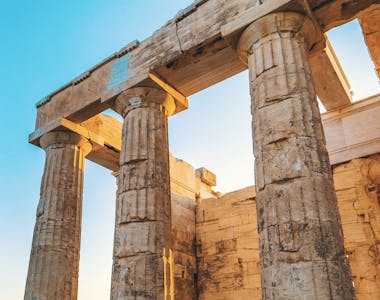

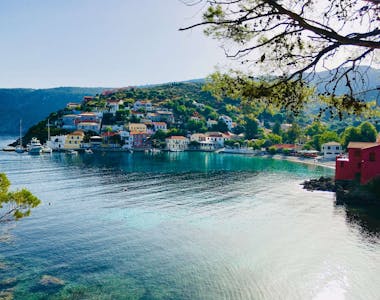
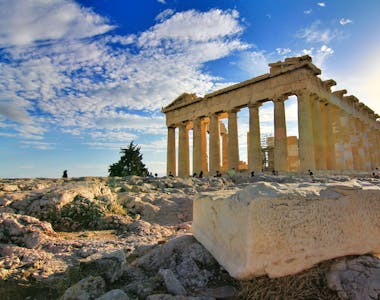
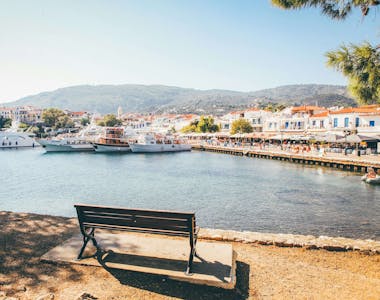
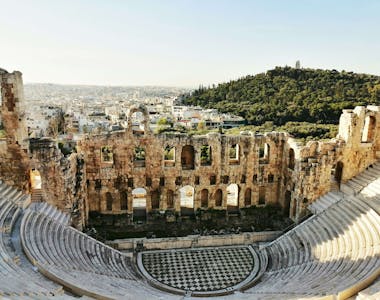

Book With Confidence
Monthly Payments
Spread the costs with no interest or additional fees
Best Price Guarantee
We won't be beaten on price. If you find this adventure at a lower price please get in touch!
Reserve now & pay later
Reserve your adventure today and pay later, free of charge
ATOL protected
Book with confidence
Hold your space today, for free
or book your trip with a deposit and then pay the rest in instalments.
Reserve your flights with us
Add flights to your booking and we'll take care of the rest. You'll get 24/7 support from our team & ATOL protection.
Speak to our experts
Call or email our expert team to find out more and help with ideas and planning.









